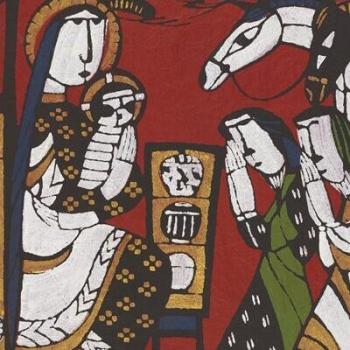Then they will see ‘the Son of Man coming in a cloud’ with power and great glory. Now when these things begin to take place, stand up and raise your heads, because your redemption is drawing near. Luke 21:27-8
Recently I had a conversation with an old friend. We’ve had the same conversation over the years, and it always revolves around the same issue. He goes to church from time to time, but he just can’t bring himself to believe in God.
He grew up in a Catholic home and as a youth he was educated by Catholic nuns. And much of what he believes about the Christian faith is an artifact of that childhood experience. We talked about just how errant much of what he was taught could be. We talked about how much of what he learned may have been the product of nuns who were not well informed about their own faith. And we talked about how much of it might be what a nine year remembers from conversations of that kind.
But some of what he was taught is also part of all-too-common misunderstandings of the Christian faith that are far from unique to him. One of those struggles arises out of his puzzlement with just how much suffering and injustice there is in the world. To his thinking, if the Christian message had any truth to it and if God existed, then evil would not exist; and if the Christian faith “worked,” then adhering to it would change the world and suffering and injustice would disappear.
I think that the presence of suffering in the world is an issue for all of us. And while the nature of the problem itself is beyond resolving in any kind of final fashion, it is worth contemplating. And while it may not be obvious at first glance, these words from the teaching of Jesus in Luke 21, speak directly to that issue.
So, what does this Gospel reading tell us about our faith and the presence of evil and suffering in the world? Jesus uses an evocative image here, but there are at least three insights it offers:
One, the Gospel is a word of hope in a broken world.
The Christian faith is not, as my friend sometimes supposes, in denial about the world, nor does it offer bland optimism about the world around us. The picture that Jesus paints of believers welcoming deliverance at the coming of the Son of Man occurs in the middle of a world enthralled to evil and suffering.
Both the Old and the New Testaments offer a sober, clear-eyed assessment of human nature. We are not “basically good.” (contra Jean-Jacques Rousseau) Left to our own devices we do not choose love. Left without direction, we do not tell the truth. We are, in fact, instinctively selfish, reflexively cruel and prone to telling lies.
It is true that far too often in recent decades some of those who teach or preach the Christian faith have shied away from this truth. We have implied that there isn’t anything terribly wrong with us or with the world that can’t be addressed by a bit of therapy or a bit of skillful social engineering. We have offered pictures of God who is a cosmic buddy. We have talked about grace and downplayed discipline. We have emphasized love over judgment. We have talked about forgiveness without repentance.
We do all of this because we were afraid of being thought of as narrow and judgmental. And – since the 1930s – we have continued to do it, because we are desperately afraid that we would be thought of as fundamentalists. I have no love of fundamentalist threats that reduce the Gospel to a matter of avoiding hell. But in failing to tell the truth about ourselves and the world, we have left Christians without the very thing that the Christian faith has offered people for two millennia: a sober assessment of ourselves and the world around us. The net result is that far too many of us lack a sense of urgency about our own faith, and we are regularly surprised, if not undone, by evidence of just how broken our world is.
That omission is spiritually and morally dangerous. And in the name of attempting to make ourselves more popular with the culture around us, we have actually robbed ourselves of of the spiritual strength and moral courage that is necessary to navigate life..
An honest assessment of our spiritual needs and the spiritual peril that the world is in is not meant to beat down those who listen to our message or to bully people with guilt. Scripture witnesses to the conviction that we are made in God’s image and that our existence is a good thing. But acknowledging our brokenness is the first step in liberating ourselves from the lies that make it possible for us to claim that we are without need. It is the first step in liberating us from the burden of the injury we have done to others, and it is the first step in liberating us from the endless cycle of failed attempts we have made to save ourselves.
An honest assessment of the world’s spiritual peril also prepares us to name the real evil that we do to those around us. Without that assessment we are caught flat-footed and are tempted to make excuses for the evil that we and others do, and we expose those who are defenseless to exploitation and brutality.
But that is not all that Jesus offers us. Without denying the reality that the world is broken, in the miracle of the incarnation Jesus stands alongside of us. He absorbs and overcomes the evil that enthralls us, and he offers us a way into the glory that God intended for us.
This fact about the Christian faith hints at a second truth underlined in the words of Jesus: Ultimately, healing is the work of God.
It has become common in Progressive Christian circles to assume that the Christian’s calling is to create a new world order. And, on the basis of that conviction, many Christians have focused their faith exclusively on politics, jettisoning anything that is specific to the life of Christian discipleship and the church.
There is a half-truth that lies behind this thinking. God is, indeed, in the business of redeeming both humanity and the world. But there are also two critical truths underlined in the teaching of Jesus.
As the picture of the faithful raising their heads and hands in praise and celebration at the approach of the Son of Man suggests, the ultimate healing of the world is the work of God, and only those who respond to the calling of God completely understand the healing that God seeks to achieve.
This is not to suggest that our witness to the world is without value. Nor is it to suggest that the world is unchanged by our witness. Whether one thinks of the role that the church has played in fighting racism and discrimination or the stands that the church has taken on behalf of women and children, such work cooperates with the purposes of God in the world and makes a difference.
But such efforts, separated from the healing vision God has for us are never adequate. And supposing that our contributions can achieve the complete healing that God longs to give us is a betrayal of our faith. Put another way, “We are not the change that we seek.”
And we should never let embarrassment over the call of God on our lives, pride in our own efforts, or a childish desire to be partisans alongside our fellow citizens keep us from witnessing to our faith or our participation in the body of Christ. Nor should we exchange the feeble and often fragile results of our own efforts for an abiding and sustaining faith in the work of God in Jesus Christ.
We lift our heads and hands before the coming Son of Man not because we passively wait his coming, not because we run from the world’s needs but because in Christ we find both inspiration, strength and hope in the one who ultimately redeems both us and our world.
This second truth brings us to a third in this vivid picture Jesus paints: The final healing that we all await lies ahead.
It is this truth that it has taken me time to explain to my friend. Eschatology – the church’s beliefs about the end and the purpose of all life – is a subject that we have trivialized for centuries as a church. In the preaching of many fundamentalist Christians, it was reduced to a question of whether people would go to heaven or go to hell. And, writ large in the preaching of some, it was reduced to little more than carrot or stick. Be good, you get the carrot labeled heaven. Be bad, you get the stick, labeled hell.
This simplistic picture missed the fact that the Christian life is a journey into God and that the real choice is between a journey into God and a journey into a hell of our own making. It also overlooked the fact that eschatology is about the purposes of God for our world. In the end, God will be revealed to be God and the purposes of God, for us, for the earth, for all of creation will be realized.
Nothing we do on our own or at any moment in history can promise what God has promised. And when we shrink from that promise, we not only neglect the hope that has been offered us, but we offer our own feeble efforts as a substitute. Anyone who has read any history or has paid attention to the way in which people who trust in human kindness have been betrayed can believe that this is an improvement on the work of God.
Only God can decisively break the power of evil and death. This is the hope of the Christian faith, the engine of resilient faithfulness, and the vision to which we give our lives. There is nothing about the vision of politicians, political parties, or social architects that can substitute for that hope. And when we offer that substitute, we walk away from the Gospel we are called to preach. More dangerously, we are tempted to embrace the totalizing visions of our own making, and – in trying to make them a reality – we are further tempted to enforce those visions through coercion. Historically, those two temptations have taken the lives of millions – whether one thinks of dictatorships on the left or the right.
Friends, we live in fearful times, and fear is the enemy of faith.
Fear whispers, you should not believe. Fear whispers, you should take matters into your own heads and hands. Fear whispers, there is no time to listen. Fear whispers, it won’t matter to be faithful.
Jesus counsels, wait for the coming of the Son of Man. In worship and celebration, lift your heads. Stand strong. Do God’s will in the world. Live in resilient courage. Rest upon God for the outcome.
We do that in our worship. We face the coming week in that confidence. May it encourage and embolden you.
Photo by Zac Durant on Unsplash













